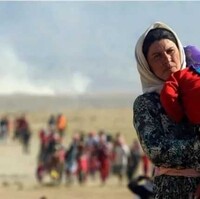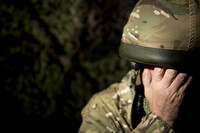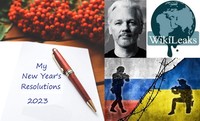Gli USA ritirano la risoluzione ONU sull'immunita' delle loro truppe
U.S. Drops Effort to Gain Immunity for Its Troops
UNITED NATIONS, June 23 — The United States bowed to broad opposition on the Security Council today and announced that it was dropping its effort to gain immunity for its troops from prosecution by the International Criminal Court.
"The United States has decided not to proceed further with consideration and action on the draft at this time in order to avoid a prolonged and divisive debate," the deputy American ambassador, James B. Cunningham, said on emerging from the council.
The envoys from the 15-member council had spent the morning in closed session discussing a rewritten version of the American troop exemption resolution circulated among them Tuesday night to try to meet the widespread objections.
A resolution granting a year's exemption had passed the council the past two years, but this year the attempt to renew it ran into difficulties because of the prisoner abuse scandal in Iraq and a strong statement of opposition from Secretary General Kofi Annan.
The rare setback for American diplomacy at the United Nations came just two weeks after the Bush administration was praised in the world organization for demonstrating flexibility and a willingness to compromise in securing a unanimous vote on a resolution affirming the arrangements for the transfer of power in Iraq.
Ambassador Wang Guangya of China, a country that had supported the measure the past two years, said, "Clearly from the very beginning this year, China has been under pressure because of the scandals and the news coverage of the prisoner abuse, and it made it very difficult for my government to support it."
"My government," he added, "is under particular pressure not to give a blank check to the U.S. for the behavior of its forces."
Spain's ambassador, Juan Antonio Yáñez-Bernuevo, explained his country's opposition by saying, "For us, the essential thing is to remain faithful to the international criminal court, which we strongly support, and also to the United Nations charter and to respect the statement made by the secretary general last week, which had a powerful effect."
Last week Secretary General Annan called on the Security Council to turn back the American move, saying it was "of dubious judicial value" and particularly objectionable in the aftermath of the prisoner abuse cases in Iraq.
In his remarks, Mr. Annan said that passing the measure would discredit the council, the United Nations and the "primacy of the rule of law," and he appealed to the members to maintain the common purpose they had shown earlier this month in their unanimous vote on the Iraq resolution.
Mr. Yáñez-Bernuevo said that he regretted that the Americans had not mounted the same kind of diplomatic effort that secured the June 8 unanimous vote behind the resolution covering the arrangements for the June 30 transfer of power to Iraq and its aftermath.
"We would have liked to see a process as we saw in the Iraq resolution, a more collective effort that would have maintained the council's unity," he said. Instead, he said, "According to what we heard from the U.S., that was the last word, they could not go any further, there was no point in pursuing the matter."
Heraldo Muñoz of Chile said of Mr. Annan's statement: "It has a very important impact on many delegations. It certainly created a new context for the consideration of this resolution."
The Bush administration has said it needs the protection to prevent people from using the court to bring politically motivated war crimes prosecutions against Americans abroad.
Elaborating on that today, Mr. Cunningham noted that the United States was the "largest contributor to global security" and said, "When the United States voluntarily commits its armed forces to participate in peacekeeping missions around the world, we believe it is wholly inappropriate to subject them to a tribunal which cannot provide adequate guarantees of due process."
Asked if the United States would limit its participation in peacekeeping activities in the future — a threat it has made in past years when disagreement over the resolution has emerged — Mr. Cunningham said, "I'm not going to comment on that."
Addressing concerns about American military conduct abroad, he said, "The United States has a well-functioning system of military justice that will assure accountability."
Since the international court was created two years ago, the Bush administration has made bilateral agreements with 90 countries to exempt its troops, and Mr. Cunningham said that that effort would continue.
This year's draft resolution, introduced last month and then withdrawn in the face of objections, extended protection to American soldiers participating in United Nations-approved peacekeeping forces beyond the current expiration date of June 30.
That same day, next Wednesday, Iraq regains sovereignty and the predominantly American force there becomes a United Nations-mandated one. The United States had consequently been pressing hard for a vote before then.
Though there were three abstentions in last year's vote and several more expected this year, American diplomats in May said they felt confident they could obtain support for a routine "technical rollover" of the measure.
Mr. Annan's appeal to Security Council unity, however, caused several nations to rethink their backing of the original resolution and of their reluctance to be seen as defying the United States. By Monday, 8 of the 15 countries let it be known that they would abstain — an outcome that would deny the United States the votes needed for passage.
Tuesday evening, American diplomats circulated a new version aimed at meeting a major objection — language in the original proposal that expressed the intention to renew the one-year exemption each July 1 for further 12-month periods "for as long as may be necessary."
Mr. Annan had protested that this clause served to perpetuate United Nations approval of what had been considered a temporary emergency departure from international law.
That paragraph had been eliminated in the new version, and new language was inserted that pledged that this request for a one-year exemption would be the final one.
That attempt to bridge the differences did not work, and Mr. Muñoz said that while he thought the United States decision had been "too rushed," it was probably the best one under the circumstances.
"Better not to present the draft resolution to a vote when the council appears to be divided," he said. "Better not to be divided after the consensus and the unity that we showed on Iraq."
Articoli correlati
- Il 26 maggio 2004 il New York Times riconobbe i propri errori pubblicando un articolo
Le presunte armi di distruzione di massa di Saddam in Iraq
Giornali come il New York Times, fino al 2003 ostili alla guerra, finirono per accettare come veritiere le affermazioni di Powell e per considerare ineluttabile l'intervento armato. A guerra terminata non fu trovata alcuna traccia di quelle fantomatiche armi.16 novembre 2023  "Breaking News", una volta tanto in positivo
"Breaking News", una volta tanto in positivoIl Regno Unito riconosce i crimini dell'ISIS contro gli Yazidi
Cercare giustizia è necessario per coloro che hanno perso la vita e per le vittime sopravvissute. E la storia merita di essere riconosciuta.2 agosto 2023 - Gulala Salih Un recente studio scientifico ripropone la questione
Un recente studio scientifico ripropone la questioneProblemi di salute mentale dei veterani e militari americani
Dopo due decenni di guerra continua in Afghanistan, una crescente popolazione di veterani si presenta per cure di salute mentale. La depressione rimane una delle principali condizioni di salute mentale nei militari. E ogni anno più di seimila si suicidano. How to fight against war disinformation? Julian Assange shows a way
How to fight against war disinformation? Julian Assange shows a way"My one and only New Year's Resolution": Letter from an ex-pacifist (now no longer "ex")
January 1st of each year is the time for formulating resolutions to keep or break (usually the latter) during the 365 days ahead. So Martina, an ex-pacifist who now is no longer “ex”, has decided to make only one resolution for 2023. “That way,” she says, “I’m sure to keep it.”8 gennaio 2023 - Patrick Boylan
Sociale.network